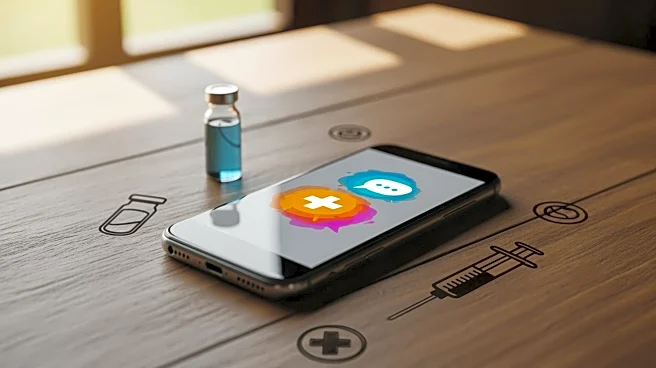What's Happening?
A cluster-randomized controlled trial conducted in the Gamo and Gofa zones of South Ethiopia evaluated the effect of mHealth interventions on childhood vaccination rates. The study enrolled pregnant women
at selected health facilities, randomly assigning them to either the intervention or control group. Mothers in the intervention group received tailored SMS messages and reminders about vaccination schedules, while the control group received standard care. The trial found that mHealth interventions significantly increased vaccination rates by addressing barriers such as forgetfulness, misinformation, and logistical challenges.
Why It's Important?
The success of mHealth interventions in boosting vaccination rates highlights the potential of digital health strategies to improve healthcare access and outcomes in rural and underserved areas. By leveraging mobile technology, healthcare providers can overcome common barriers to vaccination, such as lack of awareness and logistical difficulties. This approach is particularly valuable in regions with limited healthcare infrastructure, where traditional outreach methods may be ineffective. The findings underscore the importance of integrating digital health solutions into public health strategies to enhance preventive care and reduce health disparities.
What's Next?
The positive results from this trial may encourage further investment in mHealth initiatives, particularly in rural and underserved areas. Healthcare providers and policymakers may explore multi-platform approaches, such as SMS, voice messages, and social media, to enhance engagement and sustain behavioral change among caregivers. Additionally, expanding the use of mHealth interventions to other areas of maternal and child health could further improve health outcomes. Ongoing research and development will be crucial in refining these strategies and ensuring their scalability and sustainability.
Beyond the Headlines
The implementation of mHealth interventions raises important ethical and legal considerations, particularly regarding patient privacy and data security. As digital health solutions become more widespread, ensuring the protection of sensitive health information will be paramount. Furthermore, the cultural acceptance of mHealth varies across regions, and efforts to educate and engage communities will be necessary to overcome resistance and promote adoption. Long-term, mHealth could lead to shifts in healthcare delivery models, emphasizing remote care and digital solutions.











